🎧 Real entrepreneurs. Real stories.
Subscribe to The Hurdle podcast today!

8 Reasons Business Plans Fail That No One Wants to Talk About

Danielle Hendricks
8 min. read
Updated October 27, 2023

As a full-time editor and academic mentor at an academic writing service, I have read hundreds of business plans over the years. To help students and startups, I have compiled a list of reasons business plans are rejected or given a low grade.
Of course, there are obvious reasons that business plans fail. For example, missing crucial deadlines for finishing the business plan, or drawing hockey stick profit projections can repel potential investors.
However, there are also less nuanced and more subtle reasons that investors and banks lose interest. These tips can help you avoid the minute and often overlooked mistakes that people make when writing a business plan. When investors and banks see hundreds of business plans every month, a small mistake can lead to a business plan being thrown in the rejection pile.
- The top 8 reasons business plans fail
1. Bad business ideas
Nobody likes to talk about it, but the main reason why business plans fail is bad ideas. Most ideas look great on paper—but all too often, companies realize they have invested in a bad idea once it is too late.
To avoid this, smart businesses are using “user-driven development” (UDD) to build new businesses. Lots of ideas seem great until you figure out that the market doesn’t actually want your product. In order to ensure that a business idea is sound, entrepreneurs should search for product validation by reaching out to their target consumers before sinking huge amounts of time and money into the project.
At Stanford University’s d-school , the designers use UDD to develop products that are user-centered. Firms that want to innovate with a focus on customers often hold small meetings with the potential end users where they describe the project and then ask users for their opinions.
After the first round of discussion, the firm can go back to the drawing board to incorporate the helpful feedback. Second and even third rounds can enhance the final product’s popularity. For example, The Embrace Warmer was created by asking mothers with premature babies what they disliked about traditional infant incubators in hospital maternity wards.
The mothers responded that not being able to hold their baby was the worst part of the experience. By focusing on the needs of the end-user, the developers of The Embrace—who were also students at Stanford—were able to create a highly demanded and successful business plan. Avoid wasting time on a bad business plan by gauging the market sentiment toward your project before investing a significant amount of time and effort.
2. Employee compensation is not incentive compatible
Business plans can fail because employees are not compensated in a way that aligns the goal of the employee with the goals of the company. In game theory, a contract is an incentive compatible if “every participant can achieve the best outcome to him/herself just by acting according to his/her true preferences” (Nisan and Roughgarden, 2007). For example, if an employee is paid with annual or monthly bonuses then the employee will only do what is good for the company in the short run.
In 2015, Forbes released a nice article on different salary packages for different company goals. One option is to offer tailored benefits to the employee. Startups and small businesses can offer more customized salary packages than large multinational corporations.
For example, instead of offering a standard salary package of retirement plans, child-care assistance, savings program, determine what the employee wants the most. For example, elderly employees may not be motivated by child-care assistance, so don’t focus on that in their package. Secondly, instead of offering an upfront payment of 2 percent of the company’s stock, offer a salary that pays that 2 percent over several years to ensure that the employee stays committed in the long-run.
3. No exit strategy for firing lazy co-founders
Anyone who has started a company knows that team conflicts are inevitable. A good business plan should have a step-by-step procedure for handling internal disputes. First of all, each co-founder should have a specific set of responsibilities with deadlines and consequences for failing to meet those deadlines.
Choosing the right co-founder is as important as choosing the right spouse. During the first few years, you may end up spending more time with the co-founder than anyone else. First, you have to know what are your own strengths and weaknesses. Try to find a partner that diversifies your skill set. Also, ask for references. Try to find out who they worked for previously, how they got along with their coworkers, and why they left.
Another way to help alleviate this problem is by delineating roles and delegating tasks. However, if a team member just does not have the time or the competence to achieve the goals specific to their role, then the company should have a polite but quick method for ending the relationship. Mentioning how these types of situations will be handled in the business plan is important because hurt feelings and vindictive ex-owners can damage the firm’s reputation and profitability.
Brought to you by
Create a professional business plan
Using ai and step-by-step instructions.
Secure funding
Validate ideas
Build a strategy
4. The team is not balanced
Another problem that I often notice on business plans is that the team is not balanced.
Company culture is an often underestimated challenge. I have read several business plans that present a compelling argument for a new product; however, the majority of plans fail to put together a team that has the competencies required to actually execute the business plan.
For example, I recently read a tech business plan that was making a health application for smartphones. However, the team did not have a single developer or IT specialist involved. If the business idea requires 80 percent of the labor hours to be performed by a software programmer, then the team needs at least one developer onboard. It is important to keep in mind that venture capitalists sometimes refuse to fund companies that only have one founder or have unbalanced teams.
5. Detailed financial projections are missing
The majority of business plans that I have been asked to edit have conveniently left out the balance sheet, cash flow statement, profit and loss statement, and income statement . The “numbers” are actually the most interesting part of the entire document for most investors. Break-even and return-on-investment (ROI) calculations are also parts of a good business plan.
My favorite tool for ensuring that I have decent estimations and great charts are the business calculators here on Bplans . Make sure to consider how legal costs and taxes will deduct from the bottom line.
Do not forget to factor in future expenses. For example, if the company needs to purchase new office equipment every three years, then the discounted value of those expenses should be included in the forecasted financial projections. Of course, the figures are only estimates, but they are important benchmarks that can be used to measure the company’s progress toward achieving their goals.
6. Spelling and grammar mistakes
Every time that I read a new business plan, my first step is to read each sentence out loud. In order to stop my mind from automatically filling in the correct spelling and grammar, I start by reading the last sentence on the page and working my way backward to the first sentence on the page. If you want to be 100 percent certain that there are no spelling errors, then consider hiring a professional editor to review your business plan.
Although some people think hiring a professional editor is “over the top,” the reality is that the most competitive firms have a professional editor review all of their documents for accuracy. If a bank or investor reads a business plan with typos, they will start to wonder if the entrepreneur is competent enough to run a successful business.
7. False assumptions
One of the final mistakes that students and startups make is falsely assuming the values of their investors and the values of their end-users, with some of the most common false assumptions being about their political or religious affiliation. This can be game over for successful companies, so startups should be especially careful.
Several examples exist of people that falsely assumed that their opinions were not controversial or were held by the majority. For example, Matt Harrigan, CEO of the startup Packetsled, stepped down after his comments about President Trump .
One piece of advice that my dad gave me can be helpful for writing business plans: “Opinions are like armpits. Everybody’s got them, and they all stink.”
The main point is that entrepreneurs and students who are writing a business plan should do their own research about the background of their potential investors and lenders. This ensures that you will have as much information as possible before pitching or handing over a business plan.
8. Failure to improve business plan after receiving feedback
Once you have finished writing your business plan, it is a good idea to send it out to at least three people before showing it to potential investors.
Think of these three people as your board of advisors. Ask them to read the plan and look for logical gaps in the content. If one advisor recommends a change that you disagree with, do not ignore his advice. Instead, ask the other advisors for their opinions and then make a decision. Edit your plan according to their constructive criticism, and thank them for their help.
Danielle Hendricks is an academic mentor at ACAD WRITE . In her free time, she is known for writing outgoing and funky pieces about the startup scene in Santa Fe, New Mexico.

Table of Contents
Related Articles

4 Min. Read
10 Business Plan Myths That Hurt Your Business

1 Min. Read
10 Questions to Ask Before Hiring a Business Plan Writer

14 Min. Read
15 Ways to Use and Get Incredible Value From a Business Plan

6 Min. Read
11 Common Business Plan Mistakes You Should Avoid
The LivePlan Newsletter
Become a smarter, more strategic entrepreneur.
Your first monthly newsetter will be delivered soon..
Unsubscribe anytime. Privacy policy .

The quickest way to turn a business idea into a business plan
Fill-in-the-blanks and automatic financials make it easy.
No thanks, I prefer writing 40-page documents.

Discover the world’s #1 plan building software
10 Reasons Why Your Business Plan is Failing

Ultimate Guide On Writing A Business Plan
- Vinay Kevadia
- October 23, 2024
- 11 Min Read

Business plans are the backbone of any successful venture. They are supposed to set the course for our business’s future and guide us in achieving our goals.
However, what happens when the same business plan, despite all the effort you put into it, doesn’t deliver the results you expected?
It can happen, even with the best-laid plans due to a gazillion internal and external factors.
While we can’t control them all, we sure can learn from the mistakes of others to avoid falling into the common traps.
This blog post on 10 reasons a business plan fails offers insights and advice from real-life entrepreneurs who have experienced this failure themselves.
So let’s get into it.
Top 10 reasons why business plans fail (and how to avoid them)
From insufficient market research to flawed operations—let’s uncover some of the most common reasons for business plan failure.
1. Not pivoting quickly enough
Sometimes, the very reason for a business plan failure is its inability to pivot at the right time. You see, it’s really hard to tell what will work before you put your product or service out for people’s consumption.
That said, even the most seemingly perfect business idea can fail after the launch. And this may happen despite all the validation, market research, strategizing, and financial planning.
However, this doesn’t mean you wrap up and call the quits after your business shows the first sign of failure. All it means is you acknowledge the failure, get market feedback, and pivot your plan .
Yes PIVOT. Don’t get too attached to the business idea that you become blind to the other elements necessary to create a commercially viable business.
Most successful businesses today are the results of a pivot. In a Tim Ferriss podcast , the former Instagram founder, Kevin Systrom , encourages entrepreneurs to fail and reiterate their plans until they find a business product that can survive.
While the entire podcast is packed with insight, here’s something to think through.
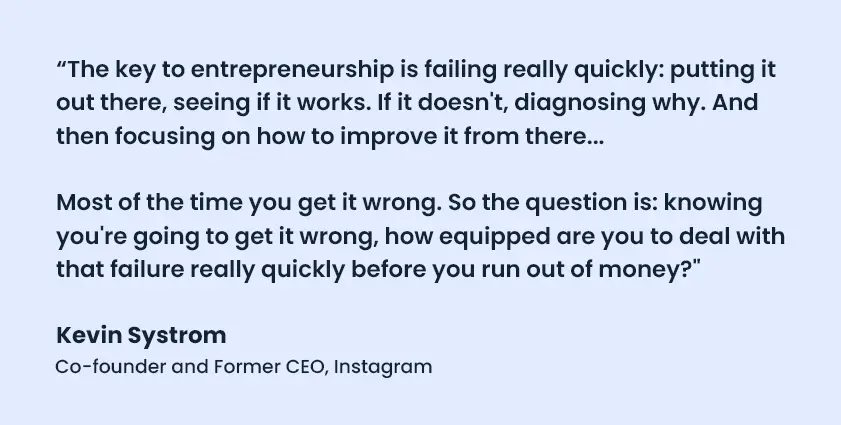
2. Not being put to use

Even your most relevant business plans will fail if you don’t put them to use.
It doesn’t matter whether your plan is a 40-page fully detailed document or a 10-page document offering a roadmap. All that matters is you use your business plan to make decisions and track the progress.
When you use your business plan, you don’t lose track of your ultimate vision. You remain dedicated to your goals and successfully navigate through difficult situations.
Far too often, business owners create a plan and then shelve it. They forget that it’s a living document, supposed to undergo regular reviews and updates. Ideally, a quarterly or an annual update to maintain its relevance.
In short, one of the easiest ways to avoid business plan failure is by putting the plan to use.
3. Rigidity and inflexibility
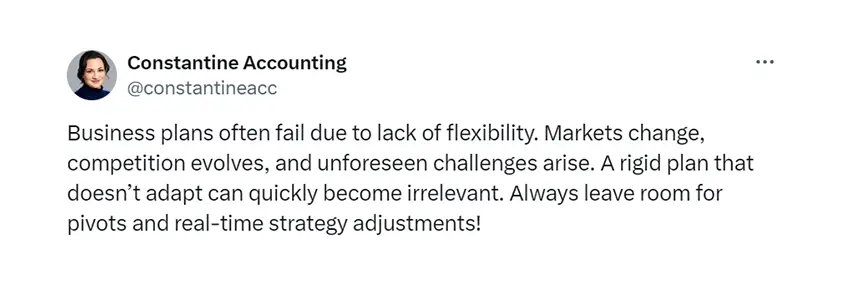
As harmful as it is, to not follow a business plan, following it too rigidly is also a problem.
As Tommy Mellow says, it’s easy to get tunnel vision and stick to a plan just because it’s what you laid out. However, business plans aren’t set in stone.
Market shifts. Preferences change. Competition evolves. And before you know it, you might need changes that weren’t mapped in your business plan.
For instance, you might have mapped your marketing channels in a business plan. However, market feedback reveals that some of these channels are ineffective, while new, more promising ones have emerged.
In such cases, if you ignore the market feedback and stick rigidly to your original plan, you risk missing out on a valuable opportunity to capture a larger market share. Besides, if you continue to invest in outdated strategies, you may incur unnecessary costs.
To avoid getting stuck in a situation where the plan fails you, keep room for strategic adjustments. Regularly review the progress of your goals, keep an eye on financial fluctuations, and immediately recognize the strategies not working for you.
Don’t build your plan on extreme certainty. Allow it to evolve with the changing market situations and embrace the new challenges and opportunities as they arise.
Remember, a business plan is only as good as your ability to adapt when it crumbles.
4. Too much planning
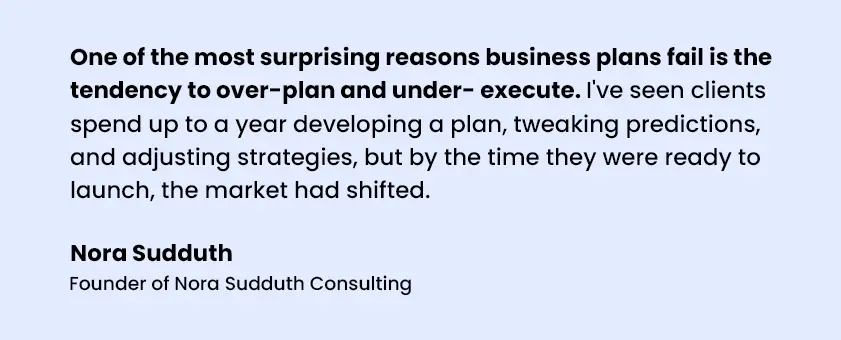
Nora Sudduth , founder of Nora Sudduth Consulting
Over-planning kills the business idea.
It’s impossible to know with 100% certainty that a business idea would turn successful.
Instead of spending months and years perfecting a business plan, get in the market. Test your ideas, gather market feedback, reiterate your offerings, and adapt your plan.
It’s actually as simple as that (maybe not). However, the longer you spend planning, the further you’re distancing yourself from market reality.

As this tweet by AstroBae asserts, focus on a few key areas and pursue them intensely.
If your business model is sustainable, you will eventually find the right mix of marketing channels, operations, and sales. As for the product, it’ll evolve with the customer’s needs and the shifts in the competitive landscape.
5. Incomplete business plans
One of the biggest business plan mistakes is having the strategic and fundamental aspects of your plan unclear.
Regardless of short or long, every business plan should answer a few fundamental questions, such as:
- What is the vision of your business?
- What are the business milestones and its short-term objectives?
- What is the size of your target market?
- What is your competitive advantage in the market?
- What would be the cash-flow situation in the business?
- How will the business operations be handled?
- What’s the problem you’re trying to solve?
Analyze and check if your business plan answers these questions. If not, address the gaps with proper planning and get your business a reliable roadmap to follow.
Create winning business plans with our
AI Business Plan Generator
Plans starting from $7/month

6. Poor execution

Execution is the most important part of planning. If your execution is flawed, even the most successful business strategies will fail.
Now, you may have high-level objectives for your business. However, it’s important to break them down into concrete, manageable tasks. Without that, you would just be navigating your way in the dark.
We interviewed a couple of entrepreneurs to understand how lack of execution leads to business plan failure. Well, the insights surely offered some refreshing views.

Brooke Webber , Marketing Head at Ninja Patches
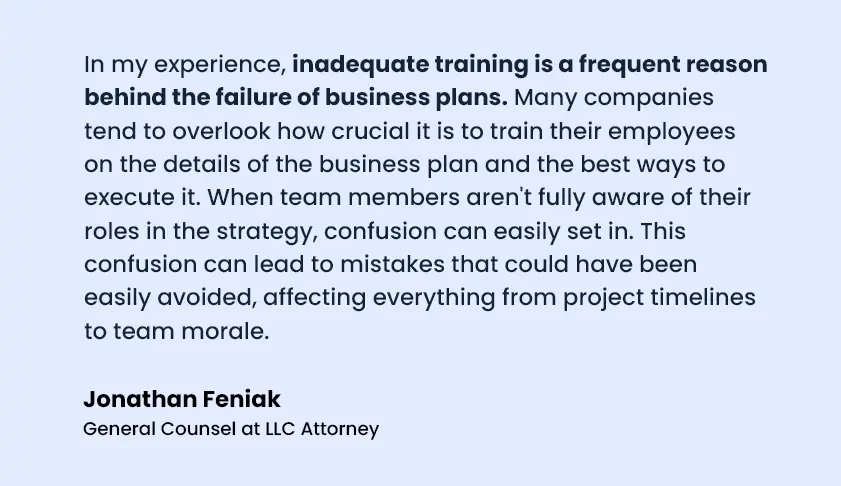
Jonathan Feniak , General Counsel at LLC Attorney

Liamaust , Founder at Entrepreneurs HQ
So how do you fix this?
Well, here are a few ways to improve your business plan execution:
- Outline clear actionable steps to achieve goals
- Clearly communicate the roles and responsibilities
- Ensure efficient and sufficient resource allocation
- Set clear performance measurement systems
- Practice effective leadership
7. Limited market research

Elisa Montanari , Head of Organic Growth at Wrike
Business plans often fail when they are built on insufficient market research data.
To make informed business decisions, entrepreneurs need a deep understanding of their market, target audience, and competition. However, most entrepreneurs either spend too little time gathering data or rely on outdated, superficial information to make important business decisions.
This lack of thorough research results in:
- Inflated demand projections
- Misidentifying your wrong audience
- Product-market mismatch
- Misjudged competitive edge
- Misinterpreting customer preferences
- Missing market trends
- Setting a wrong pricing strategy
A business plan built on shaky market assumptions may seem perfect on paper. However, in reality, it’s nothing more than a display of your assumptions.
These assumptions result in costly mistakes, not only monetarily, but in terms of time and reputation as well.
To avoid creating a business plan offering a false market overview, gather trustworthy data through primary and secondary sources. Focus on interpreting the data correctly and avoid favorable biases in your analysis.
Most importantly, talk to your potential customers. Understand their pressing problems, establish the importance of your solution to them, and make necessary shifts to your offerings.
8. Inadequate financial planning
Another reason for business plan failure is insufficient and unrealistic financials.
Entrepreneurs tend to create projections that are more aspirational than practical. There’s either an overestimation of revenue or an underestimation of costs.
Adding to it, most businesses have zero understanding of the funding essential to kickstart their business. They often underestimate their investment requirements and fail to account for additional funding rounds in their business plan. This often leads to a cash crunch, sooner or later, drawing the business plan towards failure.
To ensure that your business plan builds on realistic financials, keep a very balanced perspective.
Include all sorts of expenses, even the miscellaneous ones, in your expense forecasts. As for your revenue estimates, adopt a conservative approach. Further, create a cash flow forecast that accounts for slower-than-expected sales and unexpected expenses.
This will help you create projections grounded in reality rather than wishful thinking.
That said, financial planning isn’t sufficient. Managing finances is equally important and every entrepreneur must learn this art.
As Pedro Orlando , the visionary behind Evrythink suggests in his Twitter thread:

9. Lack of collaborative input
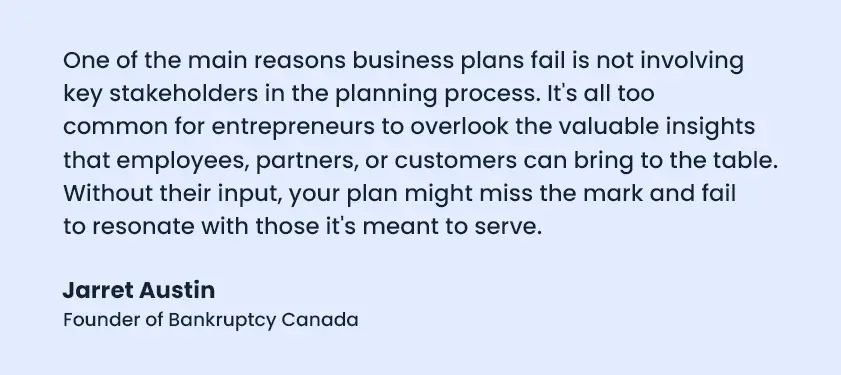
Jarret Austin , Founder of Bankruptcy Canada
If you don’t involve the key stakeholders in the planning process, the resulting plan is likely to be disoriented from reality. After all, planning is a collaborative process. There’s no possible way for you to have all the answers on your own.
By involving the stakeholders, managers, leaders, and key employees in your planning process, you get inputs and insights that are impossible to know on your own.
For instance, involving your customer support team in the planning process can help gain insights into common customer pain points that might not be apparent to you. Through this insight, you can adjust your product features, service offerings, or customer communication strategies to better address these concerns.
Just by involving the right people in the planning process, you shift from the space of limited knowledge to reality. This will help you create a business plan that aligns with what customers truly want and need.
10. Highly generalized plan
Sometimes, a business plan fails merely because it’s not customized for its audience.
A generic, one-size-fits-all business plan might miss the mark when presented to different stakeholders. Be it an investor, a potential partner, or an internal team—every audience has its own interests and priorities when reading a business plan. Failing to tailor the plan results in a lost audience.
For instance, a business plan prepared for investors might focus more on financial projections, market analysis, and ROI. However, a business plan prepared for potential partners might detail everything from product technicalities to a hiring plan. If you approach investors with a 40-page plan, they might not pay you any heed.
To avoid such situations, research your audience (i.e. investors). Understand what they prioritize in a business plan and focus on presenting that information more effectively.
However, despite all the customizations, sometimes a business plan might just not align with what the investor is looking for.
For instance, Paul Graham , a renowned investor revealed never having read a business plan. As per his Twitter thread:

Now, if he were the investor you were approaching, you simply wouldn’t need a business plan to begin with.
That said, the absence of a business plan shouldn’t be mistaken for an absence of business planning. It’s quintessential regardless of whether you require a plan or not.
How Upmetrics can help to improve your business plan
The reason you’re here is because your business plan is failing you. Despite your best efforts, it isn’t delivering the results you expected.
Well, don’t give up on the business plans just yet. They are the roadmap to your success and you know it. Instead of shelving them, let’s focus on refining your existing plan with the Upmetrics .
With the Upmetrics business planning app, you get a guided workflow to strengthen your overall business planning. Its modern business plan templates and AI assistance allow you to focus on important business plan aspects such as market research, financial planning, strategic planning, and operations.
With Upmetrics you can prepare a fully relevant and successful business plan without feeling lost.
Build your Business Plan Faster
with step-by-step Guidance & AI Assistance.
Frequently Asked Questions
What are the common reasons for the failure of a business plan.
Some of the common reasons for business plan failure include:
- Rigidity and inflexibility
- Lack of market research
- Insufficient financials
- Poor execution
- Incomplete plans
How important is adaptability in a business plan?
Adaptability is extremely important for a business plan’s success because it then allows flexible pivots and strategic adjustments as the market evolves, competition shifts, and new consumer trends emerge. A strict rigid plan makes it difficult to spot new opportunities and strategize on emerging threats.
Can a business succeed without a business plan?
The possibility of a business succeeding without a business plan is as low as reaching a new destination without a map on time. Sure, it might work, but it’s more likely to flop. A business plan sets the foundation and offers a framework and a roadmap that would take you closer to your ultimate vision.
What to do if your business plan fails?
When a business plan fails, analyze what went wrong and seek feedback from the experts (or at least someone knowledgeable). Revisit your market analysis, adjust the finances, fix your strategic approach, and communicate the changes clearly with your team.
Can I fix my business plan if it’s failing?
Yes, you can fix your business plan by identifying its weak areas and making adjustments. Update outdated market data, revisit unrealistic financial projections, and incorporate stakeholder inputs to get your plan back on track.
About the Author

Vinay Kevadiya
Vinay Kevadiya is the founder and CEO of Upmetrics, the #1 business planning software. His ultimate goal with Upmetrics is to revolutionize how entrepreneurs create, manage, and execute their business plans. He enjoys sharing his insights on business planning and other relevant topics through his articles and blog posts. Read more
Get started with Upmetrics Al
- 400+ sample business plans
- Al-powered financial planning
- Collaborative workspace
Reach Your Goals with Accurate Planning
Blog Your Business Plan Will Fail and Here’s Why
- Business Development
- Peer Groups
- Profit Potential Opportunity
- Solomon Coyle Team
- Strategic Planning

In the business world, a well-crafted strategic business plan is often hailed as the roadmap to success. It outlines a company’s strategy, goals, and financial projections, serving as a guide for decision-making and a tool for attracting financing. However, many businesses fail despite the meticulous effort to create these plans. A significant reason is the failure to implement the business plan effectively. Let’s explore the importance of business plans, the common reasons why they fail to be implemented, and the consequences of such failures.
Exploring Business Plan Types and Their Unique Goals
A business plan is a comprehensive document that details a company’s strategy for achieving its goals. It typically includes sections on the company’s vision and mission, market analysis, organizational structure, product or service offerings, marketing strategies, and financial forecasts. The purpose and type of business plan is multifaceted:
Strategic Planning (Strategic Objective Plan): It serves as a blueprint for the company’s growth and development, helping to align the team with a shared vision. Strategic business plans highlight your strategic initiatives, define your business strategies, and outline a roadmap to take you there. It covers the nitty-gritty about your company’s goals, mission objectives, and long-term vision.
A Funding Tool (Traditional Plan): Investors and lenders often require a traditional business plan to assess a business’s viability before committing capital. This plan would include the company’s history, financial projections, and detailed analysis.
Performance Measurement (Operational Plan): An operational plan provides benchmarks against which the company’s progress can be measured, enabling management to make informed decisions.
Risk Management (Scenario Plan): A scenario plan helps safeguard the company’s future by identifying potential risks and outlining mitigation strategies.
The Gap Between Planning and Implementation = Failure
Despite their crucial role, business plans’ effectiveness is contingent upon proper implementation. Thomas Edison said it well when he stated, “Strategy without execution is a hallucination.” A well-conceived plan that is poorly executed is of little value. Ninety percent of strategic plans fail to be implemented or executed. The gap between planning and implementation is a common pitfall for many distributors, and it can show up in several ways.
Lack of Buy-In and Commitment
For a business plan to be successfully implemented, buy-in and commitment from all stakeholders (including the management team and employees) are required. If leadership is not fully committed to the plan, it will unlikely be executed effectively. Similarly, if employees do not understand or believe in the plan, their efforts may be half-hearted, leading to subpar execution.
Inadequate Resources
Even the most detailed and realistic business plan will fail if the necessary resources are not allocated. This includes financial resources, human capital, and time. Companies that underestimate the resources needed to implement their plan often struggle to keep up, leading to delays and failure.
Poor Communication
A business plan is only as good as the communication that accompanies it. If the plan is not communicated to all relevant parties, achieving alignment and coordination won’t be easy. Poor communication can lead to misunderstandings, duplication of efforts, and missed opportunities. This is key to the change management process required to make change happen. Noted author and commentator Edward de Bono stated, “The best companies have a strategy that is simple, coherent, and clear.”
Lack of Flexibility
While a business plan provides a roadmap, it should not be so rigid that it cannot adapt to changing circumstances. The business environment is dynamic, and companies must be prepared to adjust their plans in response to new information, market conditions, or unforeseen challenges. A failure to adapt can render a business plan obsolete, leading to missed opportunities and strategic missteps.
Ineffective Leadership
Leadership plays a crucial role in implementing a business plan. Leaders are responsible for driving the plan forward, making critical decisions, and ensuring the team remains focused on the goals. Ineffective leadership can result in a lack of direction, poor decision-making, and failure to address challenges as they arise.
Failure to Monitor and Measure Progress
A business plan is not a static document; it requires ongoing monitoring and evaluation to ensure the company is on track to meet its goals. Without regular reviews, it is difficult to identify areas where the plan may fall short and make the necessary adjustments. Companies that fail to monitor their progress are often blindsided by problems that could have been mitigated with proactive management.
The Consequences of Failing to Implement a Business Plan
The failure to implement a business plan can have severe consequences for a company. These consequences can range from missed opportunities and financial losses to the complete failure of the business.
Financial Instability
Financial instability is one of the most immediate consequences of failing to implement a business plan. A business plan typically includes detailed financial projections, including revenue targets, expense budgets, and cash flow forecasts. If the plan is not implemented, these projections are unlikely to be met, leading to cash flow problems, increased debt, and, in severe cases, insolvency.
Loss of Credibility
A business that consistently fails to meet its goals risks losing credibility with its stakeholders, including investors, customers, and employees. Investors may become reluctant to provide additional funding, customers may lose trust in the company’s ability to deliver on its promises, and employees may become disengaged. This loss of credibility can be difficult to recover from and can hinder the company’s ability to grow and succeed.

Missed Opportunities
The business environment is highly competitive, and opportunities must be seized quickly. A failure to implement a business plan can result in missed opportunities, such as entering a new market, launching a new product, or capitalizing on a trend. These missed opportunities can have long-term implications for the company’s growth and market position.
Operational Inefficiencies
Without a clear plan in place, businesses often struggle with operational inefficiencies. Resources may be misallocated, processes may be duplicated, and efforts may be wasted on initiatives that do not align with the company’s strategic goals. These inefficiencies can lead to increased costs, lower productivity, and reduced profitability.
Business Failure
In severe cases, failing to implement a business plan can lead to the complete failure of the business. Without clear direction, adequate resources, and effective leadership, the company may struggle to survive in a competitive market. The inability to adapt to changing conditions or to overcome challenges can result in the business becoming irrelevant and possibly closing its doors.
Turning Vision into Action = Business Planning Success
A business plan is an essential tool for any company, providing a roadmap for success and a framework for decision-making. However, its value lies not just in its creation but in its implementation. The gap between planning and execution is a common reason for business failure, and companies must be vigilant in ensuring that their plans are effectively executed. This requires commitment from leadership, adequate resources, clear communication, and a willingness to adapt. By bridging the gap between planning and implementation, businesses can increase their chances of success and avoid the costly consequences of failure.
Solomon Coyle can support you during the planning season as you look ahead to 2025. Whether it’s about strategy, business development, sales leadership, compensation plans, or other concerns you may have — we welcome your questions.
Visit: www.solomoncoyle.com or call us: 703.574.9100
One thought on “ Your Business Plan Will Fail and Here’s Why ”
bookmarked!!, I really like your web site!
Leave a Reply Cancel reply
Your email address will not be published. Required fields are marked *
Save my name, email, and website in this browser for the next time I comment.

- Ten Reasons Companies Fail to Implement their Business Plans
- Strategy Implementation

Implementing a business plan is an essential part of an organisation’s success, but it’s not always a straightforward process. Business plans are detailed documents that set out activities designed to achieve its operational goals , strategic goals and vision .
Despite the importance of a well-crafted business plan, many organisations struggle to implement their plans effectively. This failure to execute is a common issue and can have significant consequences, including missed opportunities, wasted resources and ultimately, business failure.
This article explores the reasons why businesses often fail to implement their plans, It also considers how to overcome these obstacles. The main reason are as follows:
1. Lack of Clarity and Specificity
A lack of clarity and specificity is one of the primary reasons why business plans fail to get implemented. Business plans are often written in general terms, making it difficult for employees to understand precisely what they need to do to execute the plan successfully. Vague goals and objectives can be confusing and may lead to miscommunication among team members.
To resolve this issue, it is essential to ensure that each objective and goal in the business plan conforms to the SMART criteria. This means that they are specific, measurable, achievable, relevant and time-bound. It is also important to provide a clear roadmap for employees that shows how what they are doing helps achieve the goals. Staying on track and ensuring that everyone is aligned with the plan’s objectives is easier when the plan is clear and specific.
2. Poor Communication
Communication is another critical factor that can cause a business plan to fail. Failing to communicate the plan’s details and objectives can result in confusion, delays and missed opportunities.
Effectively communicating a well-written business plan to everyone involved in its execution is, therefore, crucial. Consequently, it is important to establish open lines of communication and ensure that all stakeholders are kept informed of any changes or updates to the plan. Regular communication can also help to build trust and ensure that employees remain motivated and engaged in the execution of the plan.
3. Lack of Resources
Implementing a business plan often requires a significant investment of time, money and other resources. If the necessary resources are not available, it can be challenging to execute the plan effectively. This can include human resources, financial resources, equipment and technology. A lack of resources can lead to delays, subpar performance and may even result in the complete failure of the plan.
It is, therefore, crucial to ensure that the plan is realistic and achievable with the available resources. In addition, it is essential to use the available resources in the most effective way possible. Consequently, deploying resources in a way that provides the greatest return on investment is critical to successfully implement a business plan.
4. Resistance to Change
Significant changes in the way things are done are often necessary to implement a new business plan. This can be difficult for employees who may be resistant to change. Employees may be comfortable with the existing processes and systems and may resist any attempts to change them. This can result in a lack of buy-in and engagement, which can lead to delays or complete failure of the plan.
To resolve this issue, it is important to involve employees in the planning process and ensure that they understand the reasons for the change. By providing encouragement and support, it can be easier to get employees on board and encourage their active participation.
5. Lack of Accountability
Another reason why business plans fail to get implemented is due to a lack of accountability. To execute the plan successfully, it is critical that everyone involved takes responsibility for achieving their respective goals and objectives. Without accountability, employees may feel less motivated and may not take the plan’s execution seriously. This can lead to missed deadlines, incomplete tasks and ultimately, the failure of the plan.
It is important to establish clear accountability measures and ensure that everyone involved in the plan’s execution takes responsibility for achieving their respective goals and objectives. This helps to keep everyone focused and aligned towards the common objectives and holds them responsible for their actions. Regular monitoring and reporting can help track progress and identify any issues that need to be addressed, thus making sure that the plan stays on track towards achieving its objectives.
6. Lack of Flexibility
While a business plan is a crucial tool for success, it is important to remain flexible and adaptable. A significant reason why business plans fail to get implemented is due to their lack of flexibility. While a business plan provides a roadmap for achieving specific goals, it is essential to remain flexible and adaptable to changes in the business environment. Failure to adjust the plan can lead to missed opportunities, wasted resources and ultimately, business failure.
Remaining flexible is essential for implementing a business plan as it allows for adjustment to changing circumstances and helps businesses stay relevant. By adapting the plan to new information, businesses can take advantage of new opportunities and avoid potential threats, thus increasing their chances of success. Regular review and evaluation of the business plan can help identify any adjustments that need to be made to keep it relevant and effective.
7. Managing Complexity
The complexity of business plans is another reason why their implementation can fail. Business plans can be complex due to various factors, including the scope of the plan, the nature of the business and the external environment. The more complex a plan is, the more challenging it can be to implement. Complexity can make it difficult for employees to understand their roles and responsibilities, leading to confusion and miscommunication. This can result in missed deadlines, incomplete tasks and the failure of the plan.
Managing complexity is an essential element for successfully implementing a business plan. Business plans can be complex and involve multiple moving parts, making them difficult to execute. To manage complexity, businesses must break the plan down into smaller, manageable components and set clear goals and objectives for each component.
8. Lack of Leadership
Poor leadership can be a significant reason why business plans don’t get implemented. Leaders play a critical role in ensuring that the plan is executed effectively, Without strong leadership, employees may lack direction and guidance, leading to confusion and a lack of motivation.
It is, therefore, essential to ensure that the leadership team is committed to the plan’s success. They should also provide the necessary support and resources to execute it effectively. Leaders must communicate the plan’s details and objectives effectively to all stakeholders and establish clear accountability measures. By involving employees in the planning process and encouraging their active participation, leaders can manage resistance to change.
9. External Factors
Business plans may fail to get implemented due to external factors, which can be a significant reason. Business plans are developed based on assumptions about the business environment. However, unforeseen events can arise that make these assumptions no longer valid. This can include changes in the market, shifts in customer preferences, technological advancements or changes in regulations. A failure to adjust the plan to these changes can lead to missed opportunities, wasted resources and ultimately, business failure.
Regular review and evaluation of the business plan can help identify any changes that need to be made to stay aligned with the business’s goals and objectives. By staying informed about these external factors, businesses can anticipate potential risks and adjust their plan accordingly. Diversifying offerings or markets can also help mitigate the effects of external factors on the business. Engaging with stakeholders and building relationships with suppliers and customers can also help create opportunities and reduce the impact of external factors.
10. Poor Project Management
A lack of project management can be a key factor in why companies fail to implement their business plans. Without project management , it can be difficult to effectively coordinate and execute the necessary steps outlined in the plan, which can lead to a lack of clear direction, poor communication, inefficient use of resources and a lack of accountability. These factors can impact a company’s ability to achieve its goals and objectives, ultimately resulting in failure to implement the business plan successfully.
To address this issue, it’s important to establish a strong process that is provided by project management methodologies. This includes clear project goals and objectives, efficient resource allocation, regular tracking of progress and open communication among team members. By doing so, a company can increase the chances of implementing their business plan successfully and achieving their goals.
Implementing a business plan is a critical part of an organisation’s success, but it can be challenging to execute effectively. The reasons for business plans failing to get implemented are varied and complex. These include a lack of clarity and specificity, poor communication, a lack of resources and resistance to change. They also include a lack of accountability, managing complexity, poor leadership and external factors.
To overcome these obstacles, it is essential to ensure that the business plan is clear, specific, achievable and communicated effectively to all stakeholders. Adequate resources and accountability measures can also help maintain focus and ensure everyone is working towards the same objectives. Finally, remaining flexible and adaptable can help ensure that the plan remains relevant and effective in a constantly changing business environment.
CONTACT US NOW
Request Further Information or Book a Free Discovery Meeting today:
Related Categories:
Additional Resources:
Categories:
Recent posts:.
- Harnessing the Power of Causal Mapping for Better Decision-Making
- Incorporating your exit strategy in your business strategy
- What is Project Management?
- Building a Purpose-Driven Team: Recruiting Based on Company Purpose and Values
- Project Management for Non-Project Managers
- Masterclass
- Advanced Project Management for Non-Project Managers
- Introduction to Causal Mapping
- Mastering Business Planning for Lasting Success
Why do business plans fail?
Table of Contents
Bad product ideas
Poor partnerships , a lack of detail , unrealistic financial planning , how a simple app can help improve your business plan.
Unfortunately, not every business will be a success. The failure of businesses is usually due to some issue in their business plan, and there are hundreds of different issues a business plan could have.
This article will describe some of the most common reasons a business plan might fail and how you can avoid them. We’ll look at common pitfalls such as:
- Poor partnerships
- A lack of detail
- Unrealistic financial planning
Sometimes, a business plan fails simply because it focuses on bad product ideas. A bad product idea means that the product or service your business specialises in does not sell well, and the lack of sales leads to an income problem for your business.
Business plans containing bad product ideas usually come about due to a misunderstanding of the term ‘ unique selling point ’. A unique selling point is what makes your product stand out from the products of the competition. It’s a feature that makes the product better as well as being unique.
Many bad product ideas come from individuals that focus too much on the ‘unique’ part of the term unique selling point. While it is important to have a different product from anything else on the market, make sure you also know what your customers want from a product .
While it’s nice to have help running your business, it’s important to find the right person for the job before you write a contract for a business partnership . If you create a business plan as a partnership and your partner fails to fulfil their responsibilities, your business will struggle to succeed.
There are three things you may want to consider if you’re trying to avoid poor partnerships. The first is your partner’s skill set: look for someone with talents related to your business idea as well as talents you don’t possess. It’s helpful to have a diverse collection of skills within your business.
Secondly, make sure your potential partner is as passionate about the business as you are. If they aren’t, you may find that you end up doing most of the work or that they leave the business as soon as things become difficult. While measuring passion and emotional investment is challenging, finding a business partner that matches your feelings regarding your business plan is vital.
Finally, create an exit strategy. While you may have found a perfect business partner, you never know what difficulties you’ll encounter in the future. So make sure you know what to do if there is an internal conflict in your company that you can’t resolve peacefully.
When you write a business plan , you need to make sure that you plan for almost anything. One of the biggest reasons business plans fail is because they don’t account for certain situations.
It’s impossible to plan for truly unexpected problems, but a detailed business plan will account for most situations by listing off your company’s weaknesses during a SWOT analysis . SWOT stands for strengths, weaknesses, opportunities, and threats, and it’s a standard part of most business plans.
By using SWOT to list weaknesses in your business plan and potential threats to your success, you can start planning ways to deal with problems. For instance, you might identify a lack of sales as a potential threat. To account for this, you could invest in marketing or reduce your prices. If your business plan doesn’t account for these sorts of situations, it increases its chances of failure.
Another reason for lack of detail in a business plan is low-quality research or not performing research at all. Without researching the market and industry you operate in, you’ll struggle to learn about your competitors or understand your customers’ needs. Thorough research is an essential part of avoiding business plan failure.
Financial planning is essential in business. You might not know the future of your business, but with a decent financial plan, you’ll be able to avoid most obstacles to success. If your financial plan is poorly thought-out or unrealistic, though, it might not be as valuable.
Financial plans are all about mapping out your company’s growth. If you’re too optimistic about this growth, it can cause serious problems. Unrealistic expectations can cause unprepared businesses to go bankrupt very quickly.
For example, say you expect to be making £1,000 a week in sales revenue by your second week of business. Your financial plan relies on this for you to pay rent and buy supplies. If it gets to that week and you’re only making £500, you’ll not be able to pay the bills that allow your business to operate.
To avoid these problems, try lowering your expectations. Even if you think you have a fantastic product idea, it’s better to prepare for the worst than plan for the best and run into trouble. If you create a conservative financial plan that expects some success but accounts for things like low sales, your business plan is much less likely to fail.
One of the biggest parts of your business plan is the financial aspect. To create a business plan that’s unlikely to fail, you’ll need to make sure you have a good understanding of accounting and a way to track how you’re spending your money.
The Countingup app offers built-in accounting software with its business account so that you can manage all your financial data in one place.
With additional features like automatic expense categorisation, invoicing on the go, receipt capture tools, tax estimates, and cash flow insights, you can confidently keep on top of your business finances wherever you are.
You can also share your bookkeeping with your accountant instantly without worrying about duplication errors, data lags or inaccuracies. Seamless, simple, and straightforward!
Find out more here .

- Counting Up on Facebook
- Counting Up on Twitter
- Counting Up on LinkedIn
Related Resources
When to incorporate a small business.
At the beginning of your small business journey, you need to choose a
Should I lease or buy equipment for my business?
What’s more valuable to you, control or flexibility? When deciding whether to lease
‘Customer’ vs ‘Client’: What’s the difference?
The main difference between a customer and a client is that a customer
Capital allowance vs. depreciation: how to explain the difference
The main difference between capital allowances and depreciation is that capital allowances allow
Budget vs forecast: What’s the difference?
The main difference between a budget and a forecast is that a budget
Debt vs equity: Advantages and disadvantages
The main difference between debt and equity financing is that debt involves borrowing
What is the difference between an invoice and a receipt?
As a small business owner or freelancer, you’ll have heard of receipts and
Operating profit vs EBIT: What’s the difference?
The main difference between operating profit and EBIT (Earnings Before Interest and Taxes)
Small business health checklist
Running a business can be a fairly hectic job. There’s often so much
What is financial reporting? 8 must-measure metrics for small businesses
Financial reporting is a crucial part of any business. After all, you need
Bookkeeping vs accounting: what’s the difference?
The main difference between bookkeeping and accounting is that bookkeeping focuses on recording
What is the difference between gross and net profit
Profit is categorised in two ways: gross and net. Each is important in

5 Reasons Why Some Strategic Business Plans Fail
Research into the factors leading to strategic planning failure in business reveal a myriad of reasons why some companies struggle to survive in the marketplace. But the more conspicuous statistics relate to development versus implementation. Reports such as the Bridges Strategy Implementation Survey indicate that 80 of team leaders feel satisfied with their development plans, but only 44 are happy with its implementation. Spectacular strategic failures like Kodak grab headlines for all the wrong reasons, but in truth many companies suffer the same fate with business leaders failing to innovate, or senior managers failing to implement the business plan. With her extensive experience in strategic planning, Maureen Grealish outlines 5 reasons why some strategic business plans fail, and why companies struggle with this critical issue.
1. Lack of Alignment Between Strategy, Objectives, Vision and KPIs
“Some businesses develop Visions, Strategy, Objectives and KPIs independently of each other, not understanding that they should be linked. Even though they may focus on each area, the fact that they are not aligned results in lack of focus, direction and impact. The idea is to fix on a vision first, then identify a strategy that will get the business there. Once the strategy has been agreed, 5/6 Key Business Objectives for the next 12-18 months can be agreed, and with them the measurements that will measure the progress (or otherwise) towards the achievement of the objective.”
2. Lack of Discipline
“Lack of consistency in discipline will affect the outcomes from any Strategic Development Programme. A lot of discussion, time and effort can go in to developing the strategic plan of a business. The biggest reason that they fail is that the action elements are not applied, monitored regularly or refined when required. This results in lack of focus and direction. It also results in lack of energy…if actions aren’t being completed then nothing can be achieved.”
3. Lack of Accountability
“As part of the strategic plan development, actions will have been identified. Each action will have a deadline and an owner. If the MD does not encourage accountability for completion of the actions, then people will realise that there are no consequences for lack of action and the drive to complete them will be pushed to the background when other, often immediate, challenges arise.”
4. Lack of Head Space
“When managers, leaders and team members are so busy that they cannot ‘lift their heads’ away from the immediate requirements of the business, it is difficult for them to get the head space to address the medium and long-term elements of the business. It is human nature to focus on the immediate, however, it does not help a business progress towards the completion of an objective, which makes it impossible to successfully realise a vision. It takes practice and discipline to give some time to the future, and to ensure that decisions made and actions taken will assist with getting the business to where it wants to go.”
5. Lack of Courage
“It is easier to focus on the elements of our responsibilities that we know we are good at. The natural tendency is to achieve NOW. It can be more difficult to spend some of our time focusing on the future – that may be uncertain, may have risk and may be uncharted territory. We all need to be courageous to challenge what we are doing now, what is comfortable for us, and to adapt to changes which may be difficult in the short term, but will have greater impact in the longer term.”
Maureen Grealish

Equip your leaders with the tools to align their building business through people efforts with your company’s strategic objectives, driving coherence and and focused execution, with a fully engaged team.

+091 755736
[email protected]
LEAP Monument Road Menlo Galway H91YW9D
COPYRIGHT © 2024 LEAP | ALL RIGHTS RESERVED
Why Business Plans Fail and Why Projects Fail
Thousands of business plans are created every year and only a small fraction of these businesses will succeed. While these business plans may contain solid ideas, they fail for specific reasons and their creators are forced back to the drawing board. The same is true of projects within a company. Big plans are drawn up, ideas are conceived, but when it comes to the real world application of making the project work, it falls apart. If you understand some common reasons why business plans fail and why projects fail, you can be prepared to face these issues and surmount them.
Unachievable Goals and Aspirations
Setting high goals and having the best of intentions of making a business plan or a project work doesn't always turn out well in the real world. While it is important to have lofty goals, the path to achieving these goals needs to be realistic and attainable. It is one thing to want to sell a million gadgets; it is quite another to market those gadgets to the public and have them actually sell. In order to have a business plan or a project succeed, it is necessary to have achievable goals and aspirations that can be met, ideally within the first year or first few months of operation. If you have a lofty goal, that doesn't mean you have to scrap your plan – just that you need to set attainable goals along the way and be realistic with your planning.
Advertisement
Article continues below this ad
More For You
Revenue goals & objectives, cushion time in project planning, advice on business planning, what is considered a bad project manager, fundamentals of a successful business, lack of market research.
Market research is a vital part of starting a new business or project. If you don't fully understand the competition and the current situation of your marketplace, you don't have enough information to go forward. Before a business plan is drawn up or a project is begun, thorough market research needs to take place and the results need to be viewed realistically. If your niche is saturated, then you need to come up with a plan that will set your business or project apart and help it succeed. Otherwise, your voice will simply be drowned out in the crowd or never heard because there just isn't a market for it.
Productivity and Motivation Issues
Entrepreneurs are known for their ambition and their drive to succeed. It is these two points that can turn someone without a cent to their name into a multi-millionaire. But along the way determination to succeed, and the ability to stay motivated even when the tide is turned against you, are vital to success in the business world. This motivation needs to extend to employees of your business or members of your team on a project. If they are not productive and motivated, the best idea in the world will not succeed.
Improper Budgeting
Lack of real world budgeting is another important reason why business plans fail and why projects fail. You won't always be able to go to the bank for another loan to get your business or project off the ground. Eventually, your funding may dry up if you cannot get your idea going in the right direction. Research needs to be conducted ahead of time on the approximate cost of starting a business or a project and keeping it running through the first year and through growing pains. Funding sources need to be found ahead of time and eventualities need to be planned for before you get in too deep.
- Coley Consulting: Why Projects Fail
- Maryland Small Business Development Center Network: Why Business Plans Fail
Kate McFarlin is a licensed insurance agent with extensive experience in covering topics related to marketing, small business, personal finance and home improvement. She began her career as a Web designer and also specializes in audio/video mixing and design.

IMAGES
VIDEO
COMMENTS
4. The team is not balanced. Another problem that I often notice on business plans is that the team is not balanced. Company culture is an often underestimated challenge. I have read several business plans that present a compelling argument for a new product; however, the majority of plans fail to put together a team that has the competencies required to actually execute the business plan.
Top 10 reasons why business plans fail (and how to avoid them) From insufficient market research to flawed operations—let's uncover some of the most common reasons for business plan failure. 1. Not pivoting quickly enough. Sometimes, the very reason for a business plan failure is its inability to pivot at the right time.
However, many businesses fail despite the meticulous effort to create these plans. A significant reason is the failure to implement the business plan effectively. Let's explore the importance of business plans, the common reasons why they fail to be implemented, and the consequences of such failures.
A significant reason why business plans fail to get implemented is due to their lack of flexibility. While a business plan provides a roadmap for achieving specific goals, it is essential to remain flexible and adaptable to changes in the business environment. Failure to adjust the plan can lead to missed opportunities, wasted resources and ...
Unfortunately, not every business will be a success. The failure of businesses is usually due to some issue in their business plan, and there are hundreds of different issues a business plan could have. This article will describe some of the most common reasons a business plan might fail and how you can avoid them.
Spectacular strategic failures like Kodak grab headlines for all the wrong reasons, but in truth many companies suffer the same fate with business leaders failing to innovate, or senior managers failing to implement the business plan. With her extensive experience in strategic planning, Maureen Grealish outlines 5 reasons why some strategic ...
Businesses still fail at a staggering rate in both healthy and down-turned economies, and there is not any shortage of research as to why. ... " to "no market demand" or "lack of resources" to ...
While these business plans may contain solid ideas, they fail for specific reasons and their creators are forced back to the drawing board. The same is true of projects within a company.
Business plans are different for each company, whether you are looking to create a business plan for a restaurant or a new tech start-up, you should tailor the business plan and avoid these common mistakes. 1) Bad Business Ideas. One of the primary reasons why business plans fail is due to bad business ideas. Most ideas sound great in theory ...
Here are 10 reasons why plans fail. Avoid these traps and you'll be closer to your goal of implementing a strategic plan that actually achieves results and improves your business. 1.